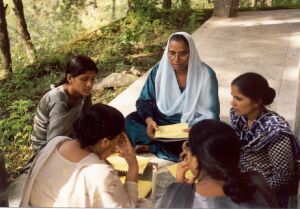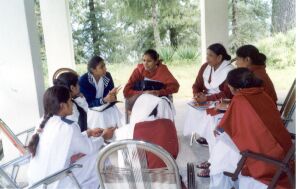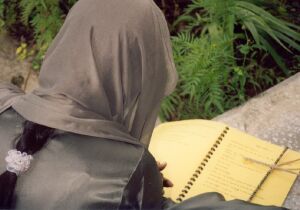"I insist on the equality of women with men. Every officer and soldier should insist upon the truth that woman is as important, as valuable, as capable, and as necessary to the progress and happiness of the world as man. Unfortunately, a large number of people of every tribe, class, and nationality think otherwise. They still believe woman is inferior to man." These are the words of William Booth in his Messages to Soldiers, a book published in Britain in 1908. That underlies the strong commitment of The Salvation Army to Gender Equality.
As The Salvation Army became established women were given leadership responsibilities. Some were sent to open new corps, others started social work among the women on the streets. Emma Booth was responsible for training women cadets. By 1878 there were nearly an equal number of women officers (41) as there were men officers (49).
Within a few years of establishing work in India the Army’s leaders recognized the necessity of training Indian women for the responsibilities of officership. The project was considered impossible by most Indians and Westerners. Indian women would not think of engaging in public work, nor would their families allow them to do so. Only two or three exceptional women had become officers. But despite the difficulties it was decided to make the experiment in South India, and Captain Clara Case was chosen to open a training college in Madras. In 1890 the first session was started with twelve women cadets and Nurani (Captain Case) as their principal. The cadets spent time in study and visitation, prayer, and open-air meetings. Once some of the women were put into prison for playing their tambourines in public. But these women were commissioned as Salvation Army Officers. The impossible had become a splendid experience, and since then thousands of women have followed their example, many as wives and some occupying positions of responsibility themselves. Nurani later appealed for more women candidates, and wrote: You are only an unpolished and simple girl? But in the hand of God, you shall become a saviour, a deliverer of your countrymen and women. If only you are willing to risk all, even to sealing your testimony with your blood. Would it be very hard to die for your country’s salvation?
One hundred years later women are still being trained as officers in training colleges throughout India. Most of the women are married and therefore their ministry is shared with their husbands. She shares in leadership of meetings, visitation, and youth work. Her dedication to her work is important. She and her husband need to pray together, share burdens, talk together, and support each other. The officer husband too needs to share in home responsibilities, thus making it possible for his wife to fulfill her commitment to the work. A woman is not super-human. She gets tired, she needs support, and during child-bearing years it may not be possible for her to engage in all activities.
Some women’s potential is limited. Other women are extremely capable and training officers will encourage further studies and development of skills as well as provide opportunities for increasing involvement in the Lord’s work.
Single women officers and officer widows usually hold their appointments. They have shown that women can hold positions of responsibility in India. They have shown that women can have an equal share with men in the work of the Church.

Captain Clara Case (Nurani - "Brightness, Shining Light")
Group discussion, Punjabi women's Bible Camp, Dalhousie.



Mizo girls from rural areas of India Eastern carrying their traditional baskets.

for related topics see: the article "Lushai Hills"
article "A New Identity"
Services 'Self-Help' group
Services 'Nutrition and Gardening'





